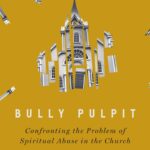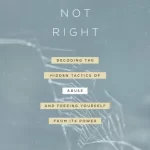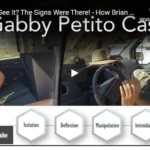Aaron Hann, a trauma and abuse counselor, explains in his October 2022 article that a key dynamic of abuse involves inappropriate assignment of responsibility. This month, Aaron Hann followed up with additional thoughts on John 9, looking at the abuse dynamics in that passage in more detail and relating it to his own experience of spiritual abuse. I remain grateful for Hann’s thoughts which have inspired this post. Hann quotes Bob Hamp as saying:
“The key dynamic of abuse is the inappropriate assignment of responsibility. This is far more devastating and insidious than it may sound at first. First the victim is made responsible to carry the anger, control, or sexual impulse of their abuser, so abuse begins.” – Bob Hamp’s Twitter Thread
Pastor Tom Pryde of the Psalm 82 Initiative has noted in his article on “Untangling the Abusive Relational System” that in deflection (one of the four tools of abusers) “the abuser seeks to make the victim take responsibility for the abuser’s own problems or, alternatively, to shift the blame to some other cause, other than themself.” Pryde notes that possible effects of deflection on the victim may include feeling guilty, indignant, or sympathetic. This may lead victims to further compliance or anger.
We could see this in an abusive marriage when an oppressed wife has guilt for not being a good wife after an entitled and controlling husband assigns blame to the wife for not living up to his expectations. Perhaps the husband blows up in anger on his wife when he arrives home from work and finds that the house is not in pristine order. In a twisted perversion, his coercive control and entitlement are hidden and the focus is put on her failures. She inappropriately carries the weight of guilt for her husband’s sin, believing her husband’s narrative that she is unsubmissive, disloyal, and lazy.
In spiritual abuse situations, a church leader will inappropriately assign responsibility to victims. A congregant may be made to carry the anger, control, or sexual impulse of an abuser. A sexual assault victim might take responsibility for a church leader’s sexual abuse and be led to believe that she caused her abuse by her dress attire or her vulnerability in counseling sessions. A victim may feel pressure to keep quiet to “prevent damage” to a pastor’s ministry or to not disrupt his family life. She carries the weight of responsibility for the abuser’s sin, despite being the victim of his abuse of power. One abusive ministry leader used the threat of suicide to pressure a victim from disclosing the truth, even to her own husband.
In John 9, we see Jesus respond to misplaced assignment of responsibility. Jesus comes to the defense of the man-born-blind when his disciples and the Pharisees misplace guilt and shame on the blind man, assuming it was because of his or his family’s sin that the man was born blind (John 9:2,34). Showing that the kingdom of God has arrived, Jesus heals the man and shows us how to use power properly and redemptively.
The Pharisees view Jesus as a threat to their power and position. The tools of these religious leaders to maintain power include the tools of interrogation, fear, putting people out of the synagogue, abusive speaking, and questioning of loyalties (John 9:22-28). Despite the outward appearance of piety and truth seeking, they were not lovers of truth. Despite multiple interrogations of the man born blind and his parents, they were not lovers of truth. Despite the proclamations of loyalty to Moses and being faithful disciples of the law, they were not lovers of truth. They already had a predetermined conclusion: Surely the man born blind was a sinner. Surely Jesus who healed the blind man was also a sinner.
The Pharisees weren’t actually seeking the truth or giving glory to God despite their words to the contrary. In reality, they could not tolerate the truth or see the real problem. They were looking for self-justification. They were looking to discredit the man born blind and shame him. They wanted the same for Jesus. When the man who was healed of his blindness did not waiver in his confession, these religious leaders insulted and reviled him and cast out the man in disgust. Hann explains that this was a form of excommunication: “In authoritarian systems, when they can no longer control you, they cast you out.”
Today, modern day “Evangelical Pharisees” still cast out victims like the Jewish Pharisees did formerly. Inappropriate assignment of responsibility can be accomplished by abusing tools like church discipline. Rather than serving a redemptive purpose, church discipline becomes a tool to enforce compliance, mark iniquities and personal offenses, and control victims. Sheep that resist abuse of authority or bring shame to religious leaders are cast out (either quietly asked to leave or publicly made into an example for others) and made to carry the weight of misplaced responsibility. The assignment of guilt and wrongdoing goes to the wrong party in the courts of the church and the courts of public opinion.
Jesus on the other hand shows us a better way. He shows us why in the very next chapter of John he is called the Good Shepherd who came to give life to the sheep. Jesus searches for the healed man after he is excommunicated, after even the man’s own parents were too intimidated and afraid to stand up for him, and Jesus transfers the guilt and shame back where it should be. He rightfully calls out the Pharisees’ blindness and guilt and shows us who is actually blind (John 9:35-41). Jesus is not afraid to take a stand with the outcasts.
Here is where we as followers of Jesus Christ can learn from his example. Jesus saw the oppressed and gave dignity to them. Do we seek out those who are cast out from our midst and seek to be ministers of healing? Jesus also holds abusive leaders accountable. Are there cases of hidden abuse and oppression and misplaced assignment of responsibility right before our eyes? I’m thinking of our marriages, churches, and work environments. How can we love the oppressed and outcast among our own circles of influence?
Dealing with abuse requires a commitment to truth. Do we really love the truth or do we merely make a public display of seeking out the truth like the Pharisees did? As Christ followers, we must have a love and passion for truth. We should not be naïve about the deceitfulness of sin. Abusers can be charming, winsome, and spin a compelling story. They believe they are justified in their own abusive actions. If we truly believe in total depravity, we know there will be bad apples across vocations, whether lawyers, doctors, police officers, judges, or pastors.
After years of being a defense attorney, I’ve learned to question police officers in court about what they know to be true versus what they believe to be true. I often catch police officers making assumptions based on their interpretation of the facts. It’s good that they are investigators… But the problem occurs when they present their conclusions to the judge as if it was fact. We can be susceptible to believing the wrong narrative.
Just because a police officer or witness testifying in court is convinced that he is right does not mean that he is actually right. An officer’s confidence in his accuracy does not always correlate to reality. I think of one of my past clients who was alleged to have gone 116 mph but my client’s dashcam saved him from going to prison and a wrongful conviction. The officer clearly made a mistake and pulled over the wrong vehicle.
We tend to believe and trust our friends or those in authority, like police officers or pastors. But as my fellow defense attorney friend tells me: “trust but verify.” This becomes even more important when we have two versions of what happened or accusations of abuse. I’ve dealt with police officers who I suspected of lying in court, who later resigned in disgrace when their unethical behavior was uncovered.
Pastor Tom Pryde of Psalm 82 Initiative writes:
Confronting abuse requires a radical commitment to the truth. This is true for the victim, who needs to be able to tell themselves the truth about their situation and to be able to recognize the abuser’s lies that they have previously believed. It is also true for the victim’s helpers, who must have a firm grasp on what is really happening and avoid any exaggerations, omissions, or unfounded predictions. The importance of this radical commitment cannot be overstated.
Consider your cognitive biases before assigning moral responsibility. For example: Is a defendant guilty just because a police officer has charged him with a crime? Is a congregant guilty of sin, simply because a pastor declares him lazy, insubordinate, or unwilling to work and provide for his family? Perhaps allegations of abuse of authority or wrongful assignment of responsibility are true?
Is a wife actually seeking to “get rid of her husband” by filing a protective order? Is it really true that she hasn’t been the same since she bumped her head on the car door just because the husband posits that story line? Has there been a true and impartial investigation?
Let us commit to being lovers of the truth, not just lovers of what we prefer to be true.
Prayer: Lord Jesus, You are God. You made us and we are yours. We are your people, the sheep of your pasture (Psalm 100:3). May we be marked by a love for truth and justice and imitate our Good Shepherd. May we see the oppressed and assign responsibility where it belongs like Jesus did, calling sinners to repentance.
To read Bob Hamp’s original twitter thread:
@BeYeReconciled Saluti, here is your unroll: https://t.co/m63RhGOh0H See you soon. 🤖
— Thread Reader App (@threadreaderapp) May 27, 2023







